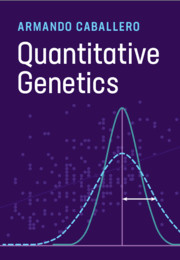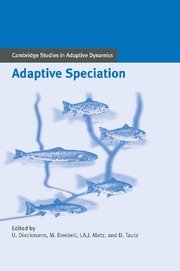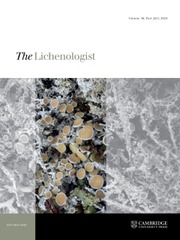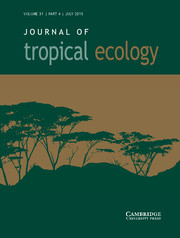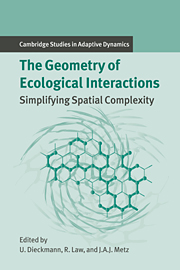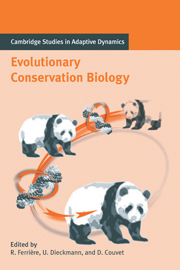
Evolutionary Conservation Biology
$63.99 USD
Part of Cambridge Studies in Adaptive Dynamics
- Editors:
- Régis Ferrière, Ecole Normale Supérieure, Paris
- Ulf Dieckmann, International Institute for Applied Systems Analysis, Austria
- Denis Couvet, Muséum National d'Histoire Naturelle, Paris
- Date Published: July 2006
- availability: This ISBN is for an eBook version which is distributed on our behalf by a third party.
- format: Adobe eBook Reader
- isbn: 9780511207051
Find out more about Cambridge eBooks
$
63.99 USD
Adobe eBook Reader
Other available formats:
Hardback, Paperback
Looking for an inspection copy?
This title is not currently available on inspection
-
As anthropogenic environmental changes spread and intensify across the planet, conservation biologists have to analyze dynamics at large spatial and temporal scales. Ecological and evolutionary processes are then closely intertwined. In particular, evolutionary responses to anthropogenic environmental change can be so fast and pronounced that conservation biology can no longer afford to ignore them. To tackle this challenge, areas of conservation biology that are disparate ought to be integrated into a unified framework. Bringing together conservation genetics, demography, and ecology, this book introduces evolutionary conservation biology as an integrative approach to managing species in conjunction with ecological interactions and evolutionary processes. Which characteristics of species and which features of environmental change foster or hinder evolutionary responses in ecological systems? How do such responses affect population viability, community dynamics, and ecosystem functioning? Under which conditions will evolutionary responses ameliorate, rather than worsen, the impact of environmental change?
Read more- Unique introduction to this area of evolutionary conservation biology
- Integrates disparate areas of conservation biology into a unified framework
- Written by leading international experts for students, practitioners and researchers in conservation biology, ecology, genetics and evolution
Reviews & endorsements
'The book is certainly of much interest for students and researchers in conservation and related fields.' Folio Geobotanica
See more reviews'The book provides an excellent overview of current tools for modelling evolutionary processes associated with different types of populations and landscape patterns … Evolutionary Conservation Biology presents a great deal of useful information related to conservation geneticists and evolutionary ecology.' Bulletin of Mathematical Biology
Customer reviews
Not yet reviewed
Be the first to review
Review was not posted due to profanity
×Product details
- Date Published: July 2006
- format: Adobe eBook Reader
- isbn: 9780511207051
- contains: 121 b/w illus. 8 tables
- availability: This ISBN is for an eBook version which is distributed on our behalf by a third party.
Table of Contents
Contributing authors
Acknowledgements
Notational standards
1. Introduction Régis Ferrière, Ulf Dieckmann and Denis Couvet
Part A. Theory of Extinction: Introduction
2. From individual interactions to population viability Wilfried Gabriel and Régis Ferrière
3. Age structure, mating system and population viability Stéphane Legendre
4. Spatial dimensions of population viability Mats Gyllenberg, Ilkka Hanski and Johan A. J. Metz
Part B. The Pace of Adaptive Responses to Environmental Change: Introduction
5. Responses to environmental change: adaptation or extinction Richard Frankham and Joel Kingsolver
6. Empirical evidence for rapid evolution David Reznick, Helen Rodd and Leonard Nunney
7. Genetic variability and life-history evolution Kimberly A. Hughes and Ryan Sawby
8. Environmental stress and quantitative genetic variation Alexandra G. Imasheva and Volker Loeschcke
Part C. Genetic and Ecological Bases of Adaptive Responses: Introduction
9. Fixation of new mutations in small populations Michael C. Whitlock and Reinhard Bürger
10. Quantitative-genetic models and changing environments Reinhard Bürger and Christoph Krall
11. Adaptive dynamics and evolving biodiversity Ulf Dieckmann and Régis Ferrière
Part D. Spatial Structure: Introduction
12. Genetic structure in heterogeneous environments Oscar E. Gaggiotti and Denis Couvet
13. Conservation implications of niche conservatism and evolution in heterogeneous environments Robert D. Holt and Richard Gomulkiewicz
14. Adaptive responses to landscape disturbances: theory Kalle Parvinen
15. Adaptive responses to landscape disturbances: empirical evidence Bruno Colas, Chris D. Thomas and Ilkka Hanski
Part E. Community Structure:
16. Co-evolutionary dynamics and extinction Judith Bronstein and Ulf Dieckmann
17. Ecosystem evolution and conservation Michel Loreau, Claire de Mazancourt and Robert D. Holt
18. The congener as an agent of extermination and rescue of rare species Donald A. Levin
19. Epilogue Régis Ferrière, Ulf Dieckmann and Denis Couvet
References
Index.
Sorry, this resource is locked
Please register or sign in to request access. If you are having problems accessing these resources please email [email protected]
Register Sign in» Proceed
You are now leaving the Cambridge University Press website. Your eBook purchase and download will be completed by our partner www.ebooks.com. Please see the permission section of the www.ebooks.com catalogue page for details of the print & copy limits on our eBooks.
Continue ×Are you sure you want to delete your account?
This cannot be undone.
Thank you for your feedback which will help us improve our service.
If you requested a response, we will make sure to get back to you shortly.
×

